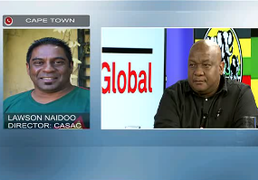Mandela’s dream has not ended, Motlanthe tells MPs
by Linda Ensor and Paul Vecchiatto
2013-12-09 15:46:28.0
THE heckling and howling that often characterises National Assembly sittings was notably absent on Monday as MPs paid tribute to former president Nelson Mandela during a special sitting.
The benches and the public gallery above, where ANC Women’s League colours were prominent, were packed to capacity. Free public gallery tickets had been quickly snapped up, and many people had to be turned away.
Deputy President Kgalema Motlanthe took to the podium first, followed by various of his political opponents, in paying tribute to Mandela.
Mr Motlanthe called on South Africa and the world to consider how Mandela’s legacy might be carried forward. He told MPs that the late president’s dream had not ended with his passing.
"The litmus test, however, is whether inheritors of his dream, heirs to his vision and adherents of his philosophy will be able to make the dream for which he lived come to pass in the fullness of time," Mr Motlanthe said.
"After the outpouring of grief, the celebration of and reflection on Nelson Mandela’s life, we will have to answer the question of how we advance towards that dream."
Mr Motlanthe also called for an examination of the current world order and the "numbed" senses of world leaders who had the power and wealth to banish poverty but had not done so.
"Why, then, do the majority of the world’s people, the great unwashed, live in abject poverty, when a fair distribution of the world’s resources would not even minimise the material comfort of those who wallow in luxury?" he asked.
The world could not claim to follow in Mandela’s footsteps with such "shocking levels of poverty living cheek by jowl with fabulously dazzling material riches".
Mr Motlanthe also said Mandela’s name had "evolved into a metaphor; the name ... has entered the pantheon of history’s sages, becoming shorthand for imperishable, trans-historical values that define human progress".
"This would explain why people of all backgrounds, nationalities, gender, age and regions of the world have suddenly succumbed to a sweeping feeling of sorrow that comes with the loss of a life that enriched the human experience."
Also addressing the special sitting, opposition Democratic Alliance leader Helen Zille said Mandela had handed a baton to South Africans, who dared not drop it.
Mandela’s grandson Ndaba Mandela represented his family at Monday’s special sitting. He placed his right hand over his heart while the national anthem was sung — something his grandfather had been prone to do.
Precinct honours Mandela
Outside the Assembly building, a steady stream of people moved through the parliamentary precinct, paying their respects to the country’s first democratically elected president.
Several buildings, including the National Assembly building, were draped in massive banners in tribute to Mandela.
Recordings of Mandela’s speeches in the House while he was president from 1994 to 1999 reverberated through the precinct, the sound coming from speakers and a big screen erected outside the building.
MPs, each carrying a single red rose, wrote messages of condolence on a canvas draped over one of the long walls leading to the Assembly building entrance.
However, some of the messages were washed away by a sudden, unexpected downpour on Monday morning. Those that remained told the stories of people who were touched by the life and death of Mandela.
Children came with their parents to remember Mandela. The children, all born after the end of apartheid, said they were learning about him in school.
One primary-school pupil, Kauthar Adams, said some of her history lessons in school this year centred on Mandela and Mahatma Gandhi.
"When it was apartheid, I wasn’t born, but I would like to see what Mandela went through in that time and how it was on Robben Island," she said. "He went through lots of stuff in apartheid and I’d just like to know, why did he fight for justice and why did he want everyone’s life to be the same?"
With Sapa
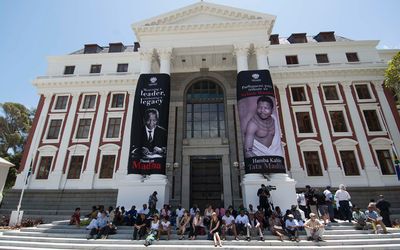
Large banners display the image of Nelson Mandela outside Parliament on Monday December 9 2013 . Picture: TREVOR SAMSON
THE heckling and howling that often characterises National Assembly sittings was notably absent on Monday as MPs paid tribute to former president Nelson Mandela during a special sitting.
The benches and the public gallery above, where ANC Women’s League colours were prominent, were packed to capacity. Free public gallery tickets had been quickly snapped up, and many people had to be turned away.
Deputy President Kgalema Motlanthe took to the podium first, followed by various of his political opponents, in paying tribute to Mandela.
Mr Motlanthe called on South Africa and the world to consider how Mandela’s legacy might be carried forward. He told MPs that the late president’s dream had not ended with his passing.
"The litmus test, however, is whether inheritors of his dream, heirs to his vision and adherents of his philosophy will be able to make the dream for which he lived come to pass in the fullness of time," Mr Motlanthe said.
"After the outpouring of grief, the celebration of and reflection on Nelson Mandela’s life, we will have to answer the question of how we advance towards that dream."
Mr Motlanthe also called for an examination of the current world order and the "numbed" senses of world leaders who had the power and wealth to banish poverty but had not done so.
"Why, then, do the majority of the world’s people, the great unwashed, live in abject poverty, when a fair distribution of the world’s resources would not even minimise the material comfort of those who wallow in luxury?" he asked.
The world could not claim to follow in Mandela’s footsteps with such "shocking levels of poverty living cheek by jowl with fabulously dazzling material riches".
Mr Motlanthe also said Mandela’s name had "evolved into a metaphor; the name ... has entered the pantheon of history’s sages, becoming shorthand for imperishable, trans-historical values that define human progress".
"This would explain why people of all backgrounds, nationalities, gender, age and regions of the world have suddenly succumbed to a sweeping feeling of sorrow that comes with the loss of a life that enriched the human experience."
Also addressing the special sitting, opposition Democratic Alliance leader Helen Zille said Mandela had handed a baton to South Africans, who dared not drop it.
Mandela’s grandson Ndaba Mandela represented his family at Monday’s special sitting. He placed his right hand over his heart while the national anthem was sung — something his grandfather had been prone to do.
Precinct honours Mandela
Outside the Assembly building, a steady stream of people moved through the parliamentary precinct, paying their respects to the country’s first democratically elected president.
Several buildings, including the National Assembly building, were draped in massive banners in tribute to Mandela.
Recordings of Mandela’s speeches in the House while he was president from 1994 to 1999 reverberated through the precinct, the sound coming from speakers and a big screen erected outside the building.
MPs, each carrying a single red rose, wrote messages of condolence on a canvas draped over one of the long walls leading to the Assembly building entrance.
However, some of the messages were washed away by a sudden, unexpected downpour on Monday morning. Those that remained told the stories of people who were touched by the life and death of Mandela.
Children came with their parents to remember Mandela. The children, all born after the end of apartheid, said they were learning about him in school.
One primary-school pupil, Kauthar Adams, said some of her history lessons in school this year centred on Mandela and Mahatma Gandhi.
"When it was apartheid, I wasn’t born, but I would like to see what Mandela went through in that time and how it was on Robben Island," she said. "He went through lots of stuff in apartheid and I’d just like to know, why did he fight for justice and why did he want everyone’s life to be the same?"
With Sapa


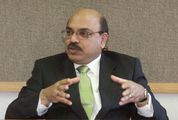


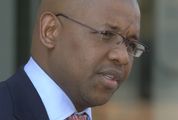





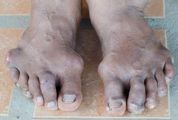

 News and views on the death, and life, of former president Nelson Mandela, with
tributes and photographs
News and views on the death, and life, of former president Nelson Mandela, with
tributes and photographs







